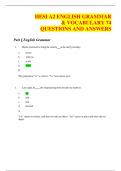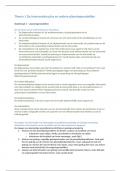Exam (elaborations)
CTRI Study guide questions and answers all are correct 2025 graded A+
- Course
- Institution
Characteristics of ACEs - Correct Answer--come in groups -produce behaviors that if sustained, created illness and disease = as a coping strategy (smoking) -Cumulative ACEs increase clinical complexity of individual case (# of lifetime mental health diagnoses increases) Clinical Complexity - C...
[Show more]







